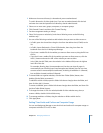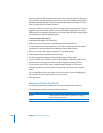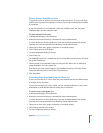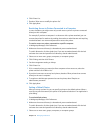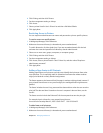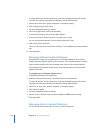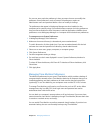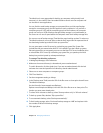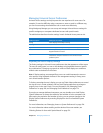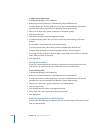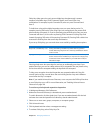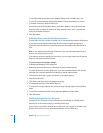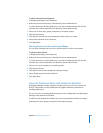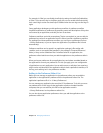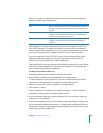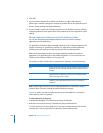
Chapter 10 Managing Preferences 227
Managing Universal Access Preferences
Universal Access settings can help improve the user experience for some users. For
example, if a user has difficulty using a computer or wants to work in a different way,
you can choose settings that enable the user to work more effectively.
Using Workgroup Manager, you can set up and manage Universal Access settings for
specific workgroups or computers dedicated to users with special needs.
The table below describes what the settings in each Universal Access pane can do.
Adjusting the User’s Display Settings
The Seeing settings in Universal Access preferences alter the appearance of the screen.
The user can easily zoom in or out on the desktop using keyboard shortcuts (specific
key combinations). Changing to grayscale or white-on-black display can sometimes
make it easier to read text on the screen.
Note: If display settings are managed Once, users can switch between the zoom or
color options using keyboard shortcuts. If the management setting is Always, users
can’t switch between options.
To further customize the user’s display, you can use Finder Views preferences to control
the size of icons in Finder windows, and use Dock Display preferences to enlarge or
magnify icons in the user’s Dock. For more information, see “Managing Finder
Preferences” on page 182, and “Managing Dock Preferences” on page 174.
If you plan to manage dedicated computers, you may be able to use local Display
System Preferences to change the resolution and number of colors computers use.
After setting the resolution and number of colors, you can prevent changes to the
Display System Preferences by removing Display from the list of available System
Preferences.
For more information, see “Managing Access to System Preferences” on page 224.
For more information about enabling assistive devices like screen readers, see
“Allowing Devices for Users with Special Needs” on page 231.
Universal Access
preference pane
What you can control
Seeing Visual display and desktop zooming
Hearing Visual alert for users
Keyboard How the keyboard responds to keystrokes and key combinations
Mouse How the pointer responds, and whether users can use the numeric
keypad instead of a mouse
Options Shortcut key combinations, the use of assistive devices, and
whether the computer reads text in the Universal Access
preference pane



